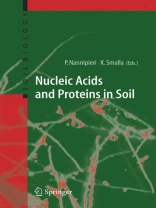With millions of different bacterial species living in soil, the microbial community is extremely complex, varying at very small scales. Microbe-driven functions are essential for most processes in soil. Thus, a better understanding of this microbial diversity will be invaluable for the management of the various soil functions.
Nucleic Acids and Proteins in Soil combines traditional approaches in soil microbiology and biochemistry with the latest techniques in molecular microbial ecology. Included are methods to analyse the presence and importance of nucleic acids and proteins both inside and outside microbial cells, the horizontal gene transfer which drives bacterial diversity, as well as soil proteomes. Further chapters describe techniques such as PCR, fingerprinting, the challenging use of gene arrays for structural and functional analysis, stable isotope probing to identify in situ metabolic functions, and the use of marker and reporter genes in soil microbial ecology.
Tabela de Conteúdo
New Frontiers in Soil Microbiology: How To Link Structure and Function of Microbial Communities?.- Chemical Structure of Organic N and Organic P in Soil.- Nucleic Acid Extraction from Soil.- Role of Stabilised Enzymes in Microbial Ecology and Enzyme Extraction from Soil with Potential Applications in Soil Proteomics.- Soil Proteomics: Extraction and Analysis of Proteins from Soils.- The Various Sources and the Fate of Nucleic Acids in Soil.- Stabilization of Extracellular DNA and Proteins by Transient Binding to Various Soil Components.- Assessing Bacterial and Fungal Community Structure in Soil Using Ribosomal RNA and Other Structural Gene Markers.- Advances in Microarray-Based Technologies for Soil Microbial Community Analyses.- Stable Isotope Probing: A Critique of Its Role in Linking Phylogeny and Function.- Gene Detection, Expression and Related Enzyme Activity in Soil.- Enzyme Activities in Soil.- How to Assess the Abundance and Diversity of Mobile Genetic Elements in Soil Bacterial Communities?.- Bacterial Conjugation in Soil.- Horizontal Gene Transfer by Natural Transformation in Soil Environment.- Reporter Genes in Bacterial Inoculants Can Monitor Life Conditions and Functions in Soil.- Reporter Gene Technology in Soil Ecology; Detection of Bioavailability and Microbial Interactions.- Marker Genes As Tools To Study Deliberately Released Soil Bacteria.












